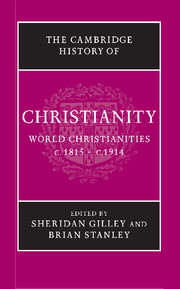Book contents
- Frontmatter
- 1 Introduction
- PART I CHRISTIANITY AND MODERNITY
- PART II THE CHURCHES AND NATIONAL IDENTITIES
- 14 Catholic Christianity in France from the Restoration to the separation of church and state, 1815–1905
- 15 Italy: the church and the Risorgimento
- 16 Catholicism, Ireland and the Irish diaspora
- 17 Catholic nationalism in Greater Hungary and Poland
- 18 Christianity and the creation of Germany
- 19 Anglicanism, Presbyterianism and the religious identities of the United Kingdom
- 20 Protestant dominance and confessional politics: Switzerland and the Netherlands
- 21 Scandinavia: Lutheranism and national identity
- 22 ‘Christian America’ and ‘Christian Canada’
- 23 Spain and Portugal: the challenge to the church
- 24 Latin America: the church and national independence
- 25 Between east and west: the Eastern Catholic (‘Uniate’) churches
- PART III THE EXPANSION OF CHRISTIANITY
- Select General Bibliography
- Chapter Bibliography
- Index
- References
21 - Scandinavia: Lutheranism and national identity
from PART II - THE CHURCHES AND NATIONAL IDENTITIES
Published online by Cambridge University Press: 28 March 2008
- Frontmatter
- 1 Introduction
- PART I CHRISTIANITY AND MODERNITY
- PART II THE CHURCHES AND NATIONAL IDENTITIES
- 14 Catholic Christianity in France from the Restoration to the separation of church and state, 1815–1905
- 15 Italy: the church and the Risorgimento
- 16 Catholicism, Ireland and the Irish diaspora
- 17 Catholic nationalism in Greater Hungary and Poland
- 18 Christianity and the creation of Germany
- 19 Anglicanism, Presbyterianism and the religious identities of the United Kingdom
- 20 Protestant dominance and confessional politics: Switzerland and the Netherlands
- 21 Scandinavia: Lutheranism and national identity
- 22 ‘Christian America’ and ‘Christian Canada’
- 23 Spain and Portugal: the challenge to the church
- 24 Latin America: the church and national independence
- 25 Between east and west: the Eastern Catholic (‘Uniate’) churches
- PART III THE EXPANSION OF CHRISTIANITY
- Select General Bibliography
- Chapter Bibliography
- Index
- References
Summary
Nation, nationalism and national identity
Nationalism is an ideology or a principle, in which the political and the cultural parts should agree. The political ambition of a nation is independence or domestic self-government, while its cultural aspiration is moral and national regeneration on the basis of a national and historical distinctive character. The main problem when nationalism became a strong political force during the nineteenth century, altering the map of Europe, was, however, that almost no European state matched such goals, because they were composite states. Another obstacle was that the cultural unit called the nation was defined in different ways. The definitions combined language, history, culture, religion and ethnicity in all kinds of permutations. Such was the case in nineteenth-century Scandinavia.
The nation is first of all an imagined community, but it is not an invented community. It is based on historical raw material, which the intellectual elite shapes to form the concept of the nation. The nation as an imagined community means that it depends on people’s consciousness of belonging to a national community characterised by certain features. These features create national identity, which becomes an important part also of individual identity. For this reason a national system of education is a central part of nation building. Furthermore, national identity describes that condition in which a mass of people have internalised the symbols of the nation, so that they may act as one psychological group when there is a threat to, or the possibility of enhancement of, nation and national identity.
- Type
- Chapter
- Information
- The Cambridge History of Christianity , pp. 342 - 358Publisher: Cambridge University PressPrint publication year: 2005
References
- 2
- Cited by

